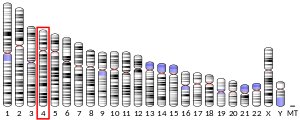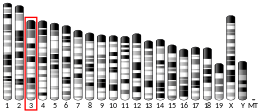FAT4
Protocadherin Fat 4, also known as cadherin family member 14 (CDHF14) or FAT tumor suppressor homolog 4 (FAT4), is a protein that in humans is encoded by the FAT4 gene.[5][6]
FAT4 is associated with the Hippo signaling pathway.[7]
Clinical significance
Mutations in FAT4 are associated to Hennekam syndrome.[8]
gollark: 9V batteries actually contain 4 1.5V batteries mostly, IIRC.
gollark: You should make infinitely many, so you can have higher or lower resistances.
gollark: Alternatively, remove the assertion.
gollark: Nuke it from orbit. It's the only way to be sure.
gollark: I mean, you can technically use it for computation without that but it would be annoying.
References
- GRCh38: Ensembl release 89: ENSG00000196159 - Ensembl, May 2017
- GRCm38: Ensembl release 89: ENSMUSG00000046743 - Ensembl, May 2017
- "Human PubMed Reference:". National Center for Biotechnology Information, U.S. National Library of Medicine.
- "Mouse PubMed Reference:". National Center for Biotechnology Information, U.S. National Library of Medicine.
- "Entrez Gene: FAT tumor suppressor homolog 4 (Drosophila)".
- Höng JC, Ivanov NV, Hodor P, Xia M, Wei N, Blevins R, Gerhold D, Borodovsky M, Liu Y (March 2004). "Identification of new human cadherin genes using a combination of protein motif search and gene finding methods". J. Mol. Biol. 337 (2): 307–17. doi:10.1016/j.jmb.2004.01.026. PMID 15003449.
- Qi C, Zhu YT, Hu L, Zhu YJ (February 2009). "Identification of Fat4 as a candidate tumor suppressor gene in breast cancers". Int. J. Cancer. 124 (4): 793–8. doi:10.1002/ijc.23775. PMC 2667156. PMID 19048595.
- Alders, M; Al-Gazali, L; Cordeiro, I; Dallapiccola, B; Garavelli, L; Tuysuz, B; Salehi, F; Haagmans, M. A.; Mook, O. R.; Majoie, C. B.; Mannens, M. M.; Hennekam, R. C. (2014). "Hennekam syndrome can be caused by FAT4 mutations and be allelic to Van Maldergem syndrome". Human Genetics. 133 (9): 1161–1167. doi:10.1007/s00439-014-1456-y. PMID 24913602.
Further reading
- Katoh Y, Katoh M (2006). "Comparative integromics on FAT1, FAT2, FAT3 and FAT4". Int. J. Mol. Med. 18 (3): 523–8. doi:10.3892/ijmm.18.3.523. PMID 16865240.
- Caporaso N, Gu F, Chatterjee N, et al. (2009). Reitsma PH (ed.). "Genome-wide and candidate gene association study of cigarette smoking behaviors". PLoS ONE. 4 (2): e4653. doi:10.1371/journal.pone.0004653. PMC 2644817. PMID 19247474.
- Liu Y, Blackwood DH, Caesar S, et al. (2010). "Meta-analysis of genome-wide association data of bipolar disorder and major depressive disorder". Molecular Psychiatry. 16 (1): 2–4. doi:10.1038/mp.2009.107. PMC 3883627. PMID 20351715.
- Need AC, Attix DK, McEvoy JM, et al. (2009). "A genome-wide study of common SNPs and CNVs in cognitive performance in the CANTAB". Hum. Mol. Genet. 18 (23): 4650–61. doi:10.1093/hmg/ddp413. PMC 2773267. PMID 19734545.
- Rose JE, Behm FM, Drgon T, et al. (2010). "Personalized smoking cessation: interactions between nicotine dose, dependence and quit-success genotype score". Mol. Med. 16 (7–8): 247–53. doi:10.2119/molmed.2009.00159. PMC 2896464. PMID 20379614.
- Ballif BA, Villén J, Beausoleil SA, et al. (2004). "Phosphoproteomic analysis of the developing mouse brain". Mol. Cell. Proteomics. 3 (11): 1093–101. doi:10.1074/mcp.M400085-MCP200. PMID 15345747.
- Johnson AD, Kavousi M, Smith AV, et al. (2009). "Genome-wide association meta-analysis for total serum bilirubin levels". Hum. Mol. Genet. 18 (14): 2700–10. doi:10.1093/hmg/ddp202. PMC 2701336. PMID 19414484.
- Lim J, Hao T, Shaw C, et al. (2006). "A protein-protein interaction network for human inherited ataxias and disorders of Purkinje cell degeneration". Cell. 125 (4): 801–14. doi:10.1016/j.cell.2006.03.032. PMID 16713569.
This article is issued from Wikipedia. The text is licensed under Creative Commons - Attribution - Sharealike. Additional terms may apply for the media files.



